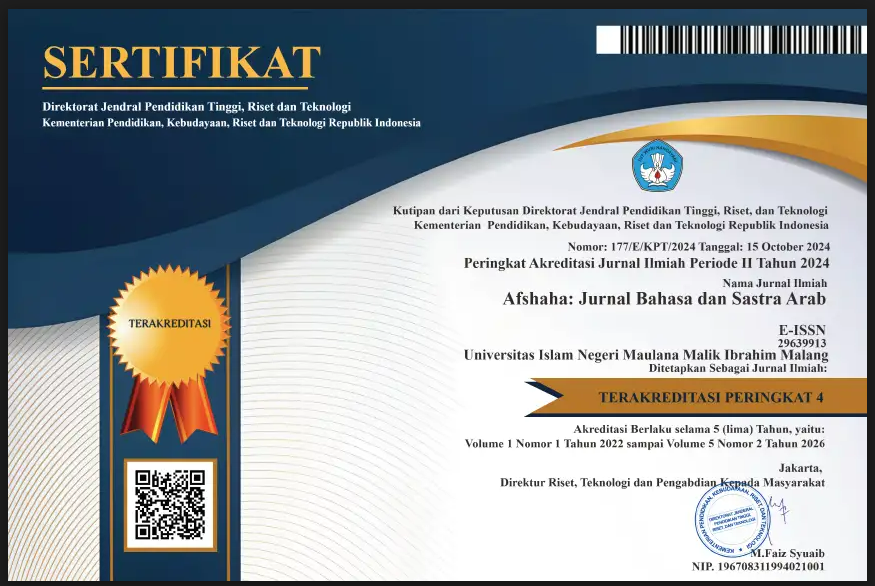Ma’na al-Hub Fi Kitaab al-Hub fi al-Qur’an al-Karim bi Qalam M. Said Ramadhan al-Buthi Istinadan Ila al-Mandzur al-Siimiiya’iy li Roman Jakobson
Abstract
Every human being planted by God since birth has a sense of love in his heart. With this feeling, man will be overwhelmed with peace and tranquility. When he knows love, he will choose who should put love first, the father and the father, the acquaintance, or the opposite sex. Or even he chose himself for him to love her. Even in this field, man may sometimes forget to declare his love for the one who instilled love in his heart. It’s Allah the Almighty who instilled love and the Messenger (peace and blessings of Allaah be upon him) was the first to feel this love and this love for man to love Allah. This paper will describe the meaning of love in the book of love in the Holy Quran by Saeed Ramadan Alp and Fold. This paper is a qualitative and descriptive research. Preliminary data are derived from the book "Love" in the Qur'an. The results of this study showed that the meaning of Love in the Qur'an is honor and the glory God gave to the Son of Adam. God's honor for people shaped who is love after following the Prophet Muhammad as the recipient of the tablet. This love leads to human beings working by submitting to the law of God Almighty. Based on the point of view of Roman Jacobson's theory of semiotics, this paper produces six important elements: Thesender is Allah the Almighty, the recipient The recipient is the Prophet Muhammad (peace and blessings of Allaah be upon him), the message and symbols are the verses that are revealed according to reality, and the context is the state or that surrounds the revelation of the verse, while the connection is when God spoke and his angels Gabriel transmitted it to the Prophet Muhammad.
كل إنسان زرعه الله منذ ولادته لديه شعور بالحب في قلبه. وبهذا الشعور، سيغمر الإنسان السلام والهدوء. عندما يعرف الحب، سيختار من يجب أن يضع الحب أولا، الوالد، أو معرفة، أو الجنس الآخر. أو حتى أنه اختار نفسه له ليحبها. حتى في هذا المجال قد ينسى الإنسان أحيانا أن يعلن حبه للذي أغرس الحب في قلبه. هو الله سبحانه وتعالى الذي أغرس الحب والرسول صلى الله عليه وسلم أول من أحس هذا الحب وبهذا الحب على الإنسان أن يحب الله . ستصف هذه الورقة معنى الحب في كتاب الحب في القرآن الكريم بقلم سعيد رمضان البوطي. هذه الورقة هي بحث نوعي وصفي. البيانات الأولية مستمدة من كتاب "الحب" في القرآن. أظهرت نتائج هذه الدراسة أن معنى الحب في القرآن هو التكريم والمجد أعطاهما الله لابن آدم. وشكل تكريم الله للناس من هو المحبة بعد الاتباع بالنبي محمد كمستلم للوحي. هذه المحبة تأدي إلى البشر العملين بالخضوع لشريعة الله عز وجل. استنادا إلى وجهة نظرية رومان جاكوبسون في السيميائية، تنتج هذه الورقة ستة عناصر مهمة، وهي: المرسل هو الله سبحانه وتعالى، المستلم والمتلقي هو النبي محمد صلى الله عليه وسلم، والرسالة والرموز هما الآيات المنزلة حسب الواقع، والسياق هو الحالة أو التي تحيط بنزول الآية، في حين أن الاتصال هو عندما كلم الله وينقله ملائكته جبريل إلى النبي محمد.
Full Text:
PDFReferences
Abu Sana’ Shibahal-Din, A. (al). (t.t.). Ruh al-Ma‘ani fi Tafsir al-Qur’an al-‘Azim wa Sab‘i Mathani. Dar al-Ihya.
Afifa, F. (2021). قيم الحب عند جلال الدين الرومي في مختارات من ديوان شمس الدين التبريزي: دراسة تحليل المضمون [Undergraduate, Universitas Islam Negeri Maulana Malik Ibrahim]. http://etheses.uin-malang.ac.id/34025/
al-Buthi, M. S. R. (2011). Al-Hub fi al-Qur’an wa Dauru al-Hub fi Hayah al-Insan (4 ed.). Dar al-Fikr.
ali al-Shabuni, M. (1970). Al-Tibyan fii Ulum al-Qur’an. Daar Al-Irsyad.
Ari Prasetyo, R. (2019). Kisah cinta dalam novel “Habibie & Ainun” analisis strukturalisme Roman Jakobson tentang cinta keluarga sakinah. Institut Agama Islam Negeri (IAIN) Ponorogo.
Fahimah, S. (2018). Urgensitas Amr Nahy Dalam Memahami Ayat-Ayat Al Qur’an. Al Furqan: Jurnal Ilmu Al Quran Dan Tafsir, 1(1), 1–13. https://ejournal.iai-tabah.ac.id/index.php/Alfurqon/article/view/201
Izzati, H. N., Hakim, L., & Erliana, Y. D. (2021). Analisis Jenis Kadar Cinta Pada Pasangan Mahasiswa Menikah Ditinjau Dari Triangular Theory Of Love Di Universitas Teknologi Sumbawa. Jurnal Psimawa, 4(1), 19–25. https://doi.org/10.1234/jp.v4i1.1267
Jalaluddin, A.-S. (2002). Asbab an-Nuzul Lubab al-Nuqul Fi Asbab al-Nuzul. Muassasah al-Kutub al-Tsaqofiyyah.
Latif, M. (2019). Konsep Cinta“Al Hubb” Menurut M. Quraish Shihabd M.Said Ramadhan Al Buthi. Institut Agama Islam Negeri (IAIN) Salatiga.
Muamaroh, D. N. N., Maliyanah, A. A., & Fitriani, L. (2022). Analisis Sosiologi Sastra Dalam Cerpen “Mauthini” Karya Amani Ismail Berdasarkan Perspektif Alan Swingewood. Afshaha, 1(1), 46–58. http://ejournal.uin-malang.ac.id/index.php/afshaha/article/view/15921
Mushodiq, M. A. (2018). Representamen Cinta Dalam Kisah Nabi Sulaiman Dan Ratu Saba’ Surat An-Naml (Studi Analisis Semiotika dan Komunikasi Interpersonal). Al-Tsaqafa : Jurnal Ilmiah Peradaban Islam, 15(2), 243–257. https://doi.org/10.15575/al-tsaqafa.v15i2.3826
R. Waught, L. (1980). The Poetic Function In the theory Of Roman Jakobson. Poetic Today, 22(1a). https://www.jstor.org/stable/1772352?seq=1
Rafi, M. (2021, Juli 1). Surah At-Taubah Ayat 24, Isyarat Larangan Cinta Dunia yang Berlebihan. Tafsir Al Quran | Referensi Tafsir di Indonesia. https://tafsiralquran.id/surah-at-taubah-ayat-24-isyarat-larangan-cinta-dunia-yang-berlebihan/
Rusmana, D. (2014). Filsafat Semiotika. Pustaka Setia.
Sya’bani, M. Z. (2019). Kajian Balaghah Dalam Al-Qur’an Surat Luqman. Al-Fathin: Jurnal Bahasa dan Sastra Arab, 2(02), 197–210. https://doi.org/10.32332/al-fathin.v2i02.1902
Yunus, M. (1990). Kamus Arab Indonesia. Hidakarya Agung.
DOI: https://doi.org/10.18860/afshaha.v1i2.17606
Refbacks
- There are currently no refbacks.
Copyright (c) 2022 Afshaha
Member of:
Indexed by:
Editorial Office
Faculty of Humanities, Universitas Islam Negeri Maulana Malik Ibrahim Malang
Jalan Gajayana 50 Malang, Jawa Timur, Indonesia 65144
Phone (+62) 341 551354, Facsimile (+62) 341 572533
e-mail: afshaha@uin-malang.ac.id

Afshaha: Jurnal Bahasa dan Sastra Arab by Faculty of Humanities Universitas Islam Negeri Maulana Malik Ibrahim Malang is licensed under a Creative Commons Attribution-ShareAlike 4.0 International License.
Afshaha: Jurnal Bahasa dan Sastra Arab, e-ISSN: 2963-9913










